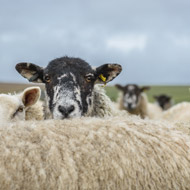
Number of cases reported higher than previously thought
New details have emerged which reveal the true scale of organophosphate (OP) sheep dipping illness.
The Sheep Dip Sufferers Group obtained HSE's 1992 Sheep Dipping Survey following a freedom of information request. The report suggests that cases of sheep dip illness were higher than previously thought.
The document states that there were 160 occasions where some form of ill-health occurred after dipping. Yet just three were reported to the Ministry of Agriculture, Fisheries, and Food (MAFF) or the Veterinary Medicines Directorate (VMD).
The Sheep Dip Sufferers group say that if the report was representative of the UK’s 90,400 sheep flocks, there would have been over 20,000 cases nationwide.
“HSE’s Epidemiology and Medical Statistics Unit suggested a better way of expressing these findings,” said campaign coordinator Tom Rigby.
“‘A crude incident rate of 8.9 self-reported illness episodes per 1000 dippers per annum’. This suggests a total of over 33,000 for MAF’s compulsory dipping years 1976-72. "
He added: “Whatever the precise figure, it does seem by 1992 HSE were aware of the devastating effects dipping was having on the health of sheep farmers. We believe this is the reason MAFF ended compulsory dipping in June that year - something they have always denied”.
The HSE survey examined sheep dipping facilities and practices on a nationwide sample of sheep farms. This included 385 in England, 155 in Scotland, and 160 in Wales.
Sufferers of Sheep Dip Illness reported symptoms ranging from nausea and headaches to longer-term joint problems and memory loss.
Initial results of the study were published as a press release in 1993, but this is the first time that the full survey has been made available.
In light of their findings, The Sheep Dip Sufferers Support Group are now urging the Government to disclose correspondence between HSE and MAFF in the weeks before the decision to end compulsory dipping.



 The veterinary mental health charity Vetlife is inviting the veterinary community to join it for a sponsored cold-water dip.
The veterinary mental health charity Vetlife is inviting the veterinary community to join it for a sponsored cold-water dip.